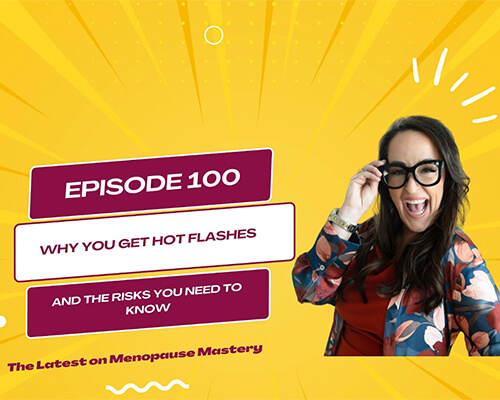 Menopausal hot flashes are one of the most common symptoms women experience as they transition through menopause. Up to 75% of women will encounter these intense episodes characterized by a sudden sensation of heat, often accompanied by sweating.
Menopausal hot flashes are one of the most common symptoms women experience as they transition through menopause. Up to 75% of women will encounter these intense episodes characterized by a sudden sensation of heat, often accompanied by sweating.
While they can be incredibly uncomfortable, hot flashes also pose significant health risks if not managed properly.
The Physiology Behind Hot Flashes
Hot flashes are a result of the hypothalamus—located at the base of your brain and responsible for regulating body temperature—becoming overly sensitive to temperature changes during perimenopause and menopause. Fluctuations in estrogen levels cause the hypothalamus to misinterpret the body’s temperature, triggering heat-dissipation mechanisms like sweating and increased blood flow to the skin.
Why You Get Hot Flashes
Hot flashes are linked to declining estrogen levels during menopause. When estrogen levels drop, the body’s temperature regulation system goes haywire. The hypothalamus, which interacts closely with the pituitary gland to manage body temperature and hormone activity, becomes increasingly sensitive. This heightened sensitivity prompts sudden and often intense heat episodes that we know as hot flashes.
Various factors can worsen hot flashes, including stress, caffeine, spicy foods, and alcohol. Additionally, research suggests that the width of an individual’s thermoneutral zone—the temperature range in which the body does not need to actively control its temperature—plays a role in the frequency of hot flashes. Women with narrower thermoneutral zones tend to experience more frequent and intense hot flashes.
The Risks You Need to Know
More than uncomfortable, hot flashes can lead to many health issues if they’re not addressed:
1. Cardiovascular Risks: Estrogen plays a crucial role in maintaining blood vessel elasticity. The drop in estrogen levels can lead to blood vessel dilation, increasing cardiovascular risks. Studies indicate that hot flashes are linked to a higher risk of cardiovascular issues, including heart attacks and strokes, especially in women of color.
2. Blood Pressure Spikes: Hot flashes can cause transient spikes in blood pressure, elevating stroke risk. Long-term, uncontrolled blood pressure increases the likelihood of developing chronic hypertension.
3. Cholesterol and Insulin Resistance: Menopause often leads to increases in LDL and total cholesterol, raising the risk for cardiovascular disease. Insulin resistance also tends to heighten, increasing the likelihood of type 2 diabetes and metabolic syndrome.
4. Cognitive Function: The disrupted sleep often caused by night sweats and hot flashes can lead to brain fog, impacting cognitive performance and productivity, particularly in demanding work environments.
5. Vascular Aging: Reduced estrogen accelerates vascular aging, causing arterial stiffness and increasing cardiovascular risks.
Effective Management Strategies
Understanding that lifestyle changes alone cannot replace hormone therapy is crucial. A multi-faceted approach is necessary to effectively manage hot flashes and associated risks.
Hormone Replacement Therapy (HRT)
Hormone therapy with bioidentical hormones—estrogen, progesterone, testosterone, and DHEA—is the cornerstone for mitigating menopausal symptoms, including hot flashes. By addressing hormonal imbalance, HRT not only helps alleviate hot flashes but also offers protective effects on the brain, heart, bones, and arteries.
Complementary Herbs and Supplements
For women who cannot or choose not to use hormone therapy, certain herbs can provide symptom relief. Black cohosh, red clover, and green tea extracts have shown efficacy in reducing the frequency and severity of hot flashes and night sweats.
Additionally, supplements such as “Estro Balance Mastery,” formulated by Dallas Nutritionist Dr. Betty Murray, offer a holistic approach to managing perimenopausal and menopausal symptoms. Key ingredients like DIM, flaxseed extract, and green tea extract support estrogen management, cognitive function, and body temperature regulation.
Lifestyle Adjustments
While not a substitute for hormone therapy, lifestyle changes are vital. A balanced diet rich in phytoestrogens, regular physical activity, and effective stress management can significantly improve a woman’s quality of life during menopause. Stress, in particular, can exacerbate hot flashes, making stress-reducing practices like yoga, meditation, and mindfulness essential.
Minerva Telemedicine Service
For women seeking personalized care, Dr. Betty Murray offers Minerva, a telemedicine service providing hormone replacement therapy across the U.S. This service ensures women have access to appropriate hormone therapy, emphasizing individualized treatment plans to restore hormonal balance and manage symptoms effectively.
Proactive Medical Attention
It’s crucial for women to advocate for comprehensive menopausal care. Conventional medical practices may overlook the connection between menopause symptoms and cardiovascular risks, making functional medicine an excellent resource for a well-rounded approach to menopause management.
Manage Your Hot Flashes With Holistic Support
Hot flashes don’t have to control your life. Contact us today to schedule an appointment and get the support you need during menopause!
